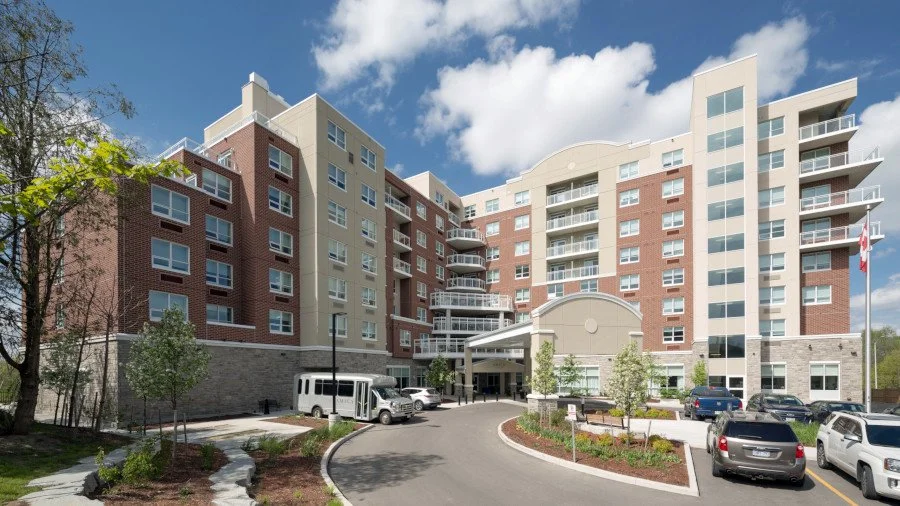Choosing the right retirement residence in Stouffville, Ontario, can feel overwhelming. There are many types of retirement living options, and finding one that matches your needs, budget, and lifestyle is key to enjoying your golden years. This guide breaks down everything you need to know to make a confident choice.
Retirement Residences in Stouffville, Ontario
Retirement residences vary widely, so it’s essential to understand the options available in Stouffville and Canada.
Definition and types of retirement homes
Retirement homes are communities designed for seniors, offering different levels of support and services. They range from independent living residences where seniors live on their own but enjoy community activities to assisted living, which provides help with daily tasks. Long-term care homes offer medical care for those with significant health needs.
Difference between assisted living, independent living, and long-term care
Independent living is perfect for seniors who want to maintain an active lifestyle with minimal support. Think of it as living in your own space with access to community amenities.
Assisted living provides help with tasks like medication reminders, personal care, and meal preparation, offering more support while still promoting independence.
Long-term care is for seniors who need continuous medical supervision and help with all daily activities. This is often for those with chronic illnesses or disabilities.
Knowing these differences helps you identify which type of residence fits your lifestyle and health needs.
Key Factors to Consider When Choosing a Retirement Residence
Choosing a retirement home is about more than just price. Here are vital factors to weigh:
Location and Accessibility
Living close to family and friends can improve your well-being. Look for retirement residences near healthcare providers, parks, and shopping centers. Easy access to public transportation or available parking is also a plus, helping you stay connected and independent.
Cost and Affordability
Retirement living costs depend on care levels, amenities, and location. Independent living usually costs less than assisted living or long-term care. Ask for a detailed list of fees to avoid surprises include rent, care services, meals, and extra amenities. Some residences also offer subsidies or financial aid programs.
Level of Care and Services Offered
Assess what kind of care you currently need and whether the residence can provide more support if your health changes. Check if they have 24/7 staff, emergency response systems, and medical professionals on site or on call.
Amenities and Social Activities
An active social life is vital. Good retirement homes offer fitness classes, hobby clubs, arts and crafts, outings, and communal dining. These activities improve mood, health, and social connection.
Safety and Security Measures
Your safety comes first. Make sure the residence has secure entrances, emergency call buttons in rooms, smoke detectors, and trained staff available around the clock.
Assess Healthcare and Support Services
Healthcare services differ greatly among retirement homes.
Availability of Nursing and Medical Care
Some residences have nurses on site 24/7 or visiting doctors to manage health concerns and emergencies. They also assist with medications and monitor chronic conditions.
Memory Care and Specialized Support
For residents with Alzheimer’s or dementia, specialized memory care units create a safe environment with trained staff and tailored programs to maintain cognitive function.
Wellness Programs and Physical Therapy
Look for retirement homes that offer physical therapy, exercise programs, and nutrition counseling. These help residents stay mobile and maintain overall health.
Evaluate Community Life and Social Engagement
A lively social environment can make your retirement years richer.
Opportunities for Social Activities
Choose residences with a full calendar of events like movie nights, book clubs, fitness groups, and cultural outings. Such activities combat loneliness and keep minds active.
Transportation and Community Events
Reliable transportation options for medical appointments, shopping, or outings allow you to maintain independence and engage with the broader community.
Inclusion and Resident Satisfaction
A good retirement home fosters inclusion where all residents feel welcome and supported. Ask about resident councils or feedback mechanisms to understand how resident concerns are addressed.
Financial Options and Assistance
Planning your finances helps you enjoy retirement without stress.
Private Pay vs Subsidized Retirement Homes
Private pay homes charge market rates based on the services provided. Subsidized homes offer reduced fees based on your income, making them more affordable for seniors on fixed incomes.
Government Programs and Financial Aid in Ontario
Programs like the Ontario Senior Homeowners’ Property Tax Grant and the Retirement Home Subsidy Program provide financial support. Eligibility depends on income, age, and residency status.
Planning for Long-Term Costs
Consider how long you can afford care at your preferred residence. Factor in potential health changes that may increase costs and explore long-term care insurance if appropriate.
Visit and Tour Retirement Homes
An in-person visit is one of the best ways to evaluate a retirement home.
What to Observe During Visits
Check how clean and well-maintained the building is. Notice staff friendliness and how residents interact with each other and the staff. The atmosphere should feel welcoming and comfortable.
Questions to Ask Staff and Residents
Inquire about staffing levels, care options, emergency procedures, and meal plans. Residents can provide honest feedback on their daily experiences.
Checking Cleanliness and Maintenance
A clean, well-kept facility usually reflects good management and respect for residents.
Reading Reviews and Gathering Recommendations
Before making your choice, research online and ask around.
How to Find Reliable Reviews?
Check trusted websites, local forums, and social media groups for feedback. Look for consistency in comments rather than one-off complaints or praises.
Talking to Current Residents and Families
Speaking with residents and their families offers insight into real-life care quality and community spirit.
Legal and Regulatory Considerations
Make sure the home meets official standards.
Ontario Health and Safety Regulations
Retirement homes in Ontario must comply with provincial laws that ensure safety, staffing, and resident rights.
Licensing and Accreditation of Retirement Homes
Homes must be licensed by the Retirement Homes Regulatory Authority (RHRA). Licensing ensures adherence to care standards and accountability.
Make the Final Decision
After all the research and visits, you’re ready to decide.
Comparing Options: Review your notes on each home’s care, costs, location, and community. Compare what fits your priorities best.
Trusting Your Instincts: Your comfort and peace of mind are crucial. Choose a home where you feel safe and happy.
Planning the Move: Prepare a moving checklist, update your contacts, and plan logistics early to reduce stress.
Frequently Asked Questions
What is the difference between assisted living and independent living?
Independent living offers seniors freedom with social activities but minimal assistance. Assisted living helps with daily tasks like medication, bathing, and meals.
How much does it cost to live in a retirement residence in Stouffville?
Costs vary widely; independent living is typically less expensive. Assisted living and long-term care include extra fees for services and support.
Can I get financial assistance for retirement living in Ontario?
Yes, programs exist for eligible seniors, including subsidies and tax credits. Check with Ontario’s Retirement Homes Regulatory Authority or local health services.
Are pets allowed in retirement residences?
Policies vary. Some homes allow pets or have designated pet areas, while others restrict animals for safety reasons.
How do I know if a retirement home is properly licensed?
In Ontario, retirement homes must be licensed by the RHRA. You can verify licensing status on their official website.



























